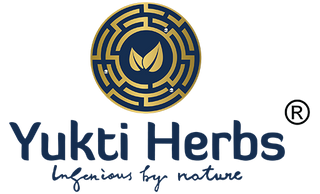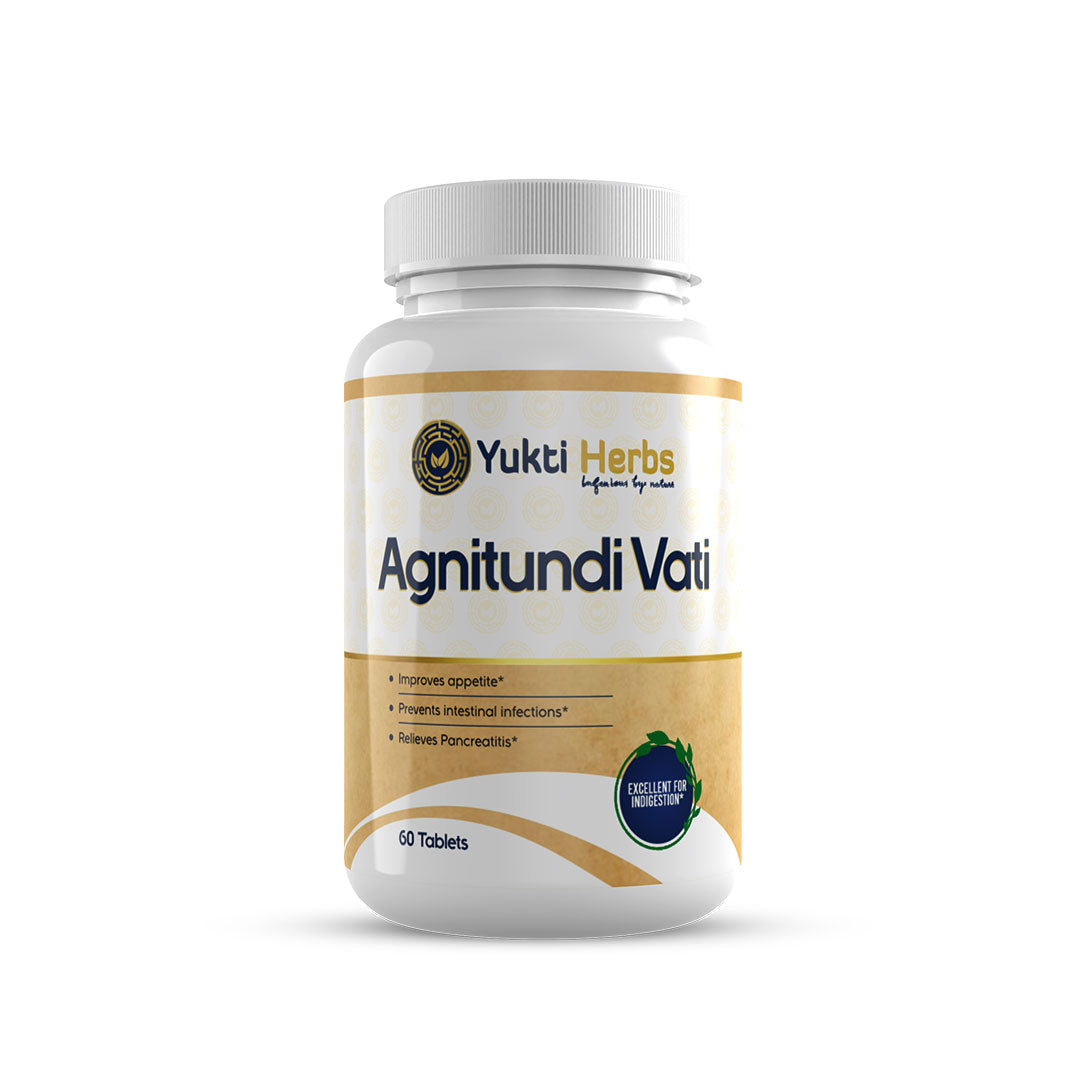
Understanding Ulcerative Colitis: 15 Most Frequently Asked Questions Answered with an Ayurvedic Point of View
This article is structured as a series of questions and answers to help patients with ulcerative colitis. The answers were developed after a lengthy discussion with our Ayurveda experts. We hope these will solve all your confusions and you will be able to understand your condition and manage it well, too, without any further need for search.
1. What is ulcerative colitis from an Ayurvedic perspective?
When aggravated, Pitta causes inflammation and ulcers in the large intestine, and your very delicate colon (Pakwashya) gets damaged by this continuous overheating. In most cases, this condition involves Pitta-dominant imbalance and stagnation, creating Kapha dosha, which turns into chronic inflammation and ulcerations. In Ayurveda, this condition is known as Pittaja Grahani or Raktaj Atisaar. As per Ayurveda, the root cause of this condition is ‘Agnimandhya’ (weakened digestive fire), which causes Ama (toxin) formation. You can understand this as caused due to long-term consequences and not just some instant mistake related to eating. Ulcerative colitis is a complex disease, and it starts from improper digestion leading to toxic accumulation, which triggers Pitta aggravation and Kapha stagnation in the large intestine (colon).
Note: This information is important for you because if you understand the root cause of your condition, you will be able to understand the Ayurvedic perspective about its treatment, reversal, or management and avoid frequent flare-ups.
2. What are the early warning signs & symptoms of ulcerative colitis according to Ayurvedic diagnostic methods?
Why do you need to understand this when you are already suffering from this condition? You need to, because once you understand this, you will be able to figure out what exactly your condition is—
-
Low Digestive Fire: Irregular appetite, heaviness after meals, indigestion
-
Aggravated Pitta Dosha: Burning sensation in the abdominal region, increased body heat, acidity or acid reflux, increased thirst
-
Changes in Bowel: Frequent loose motions or gradually increasing loose stools, mucus in stools, urgency for motions
-
Behavioural Changes: Irritability, restlessness, anger, intolerance
-
Increase in Ama (toxins accumulation): Bad breath (especially in the morning), acidic taste in the mouth, coated tongue, feeling lethargic after meals
One can notice these signs months before the final diagnosis, so an early intervention may help you to take preventive measures through changes in diet & lifestyle and adding a few basic herbs & spices to your diet & lifestyle.
3. Is complete healing or a cure possible with Ayurvedic treatment?
Ayurveda believes in restoring the balance in doshas (in this case, Pitta & Kapha majorly) rather than the suppression of symptoms like allopathy. In modern times, you do not need to follow Ayurvedic treatments blindly. There are numerous research studies and case studies available in the public domain, which you can review and verify. Well-qualified Ayurveda experts will not use some hit-and-trial methods; they will provide you with well-researched treatment protocols and standardised Panchakarma therapies, the effectiveness of which you can start feeling almost immediately. Once you start Ayurvedic Samyak Chikitisa, you will experience as following-
-
Improved digestive health
-
Reduction in flare-ups
-
Long-term remission
-
No Progression of the disease
-
No Bleeding & Mucus
-
Reduced bowel frequency
-
Rather than a loss of weight, you will start gaining healthy weight
-
One feels cool and calm, no irritability
-
Improved appetite and digestion
-
No abdominal pain or cramps, and no loose stools
There are fewer chances of achieving this through modern treatments. Most patients who visit our hospital share stories where they say they were on steroids, and over the years, they were asked to increase the dosage or potency. Despite such treatment, they suffered frequent flares and never got a chance to feel like their disease was not progressing.
So, once you start feeling the benefits from the above-mentioned signs & symptoms, you will easily realise that the treatment is working. Just follow the treatment protocols religiously and keep in touch with your Ayurveda expert or guide.
4. How does Panchakarma specifically help in ulcerative colitis reversal or management?
Panchakarma therapies are most known for their detoxification and relaxation benefits, and very few people know that all Panchakarma therapies are meant for the treatment of diseases. Panchakarma expert Ayurvedic doctors recommend these therapies because they know the basic principle of Ayurvedic treatments, which is ‘Shodhana’ (purification), meaning to purify the body at a cellular level. Once this is achieved, all Ayurvedic medicines, panchakarma therapies and diet & lifestyle modifications work at optimum levels on the diseased condition of a person.
The following therapies are generally recommended, varying from patient to patient:
Basti Chikitsa (Herbal Enemas): The following are the most important therapies for ulcerative colitis patients:
-
Piccha Basti: Prepared using cooling & astringent herbs to heal ulcers
-
Anuvasana Basti: Classical herbal oils are used for this enema therapy to heal the ulcers and provide a soothing effect.
-
Matra Basti: 50 to 60 ml of selected herbal oil blends are given as an enema for daily healing of the colon, which helps in easy & painless defecation.
Supportive Therapies :
-
Abhyangam: A full-body oil massage, which helps to pacify Vata Dosha and also reduce stress & anxiety-like issues.
-
Shirodhara: Medicated lukewarm oil is poured on the forehead region; this helps restore the gut-brain axis and also relieves stress, anxiety and sleeplessness.
-
Swedana: Medicated steam in a controlled environment is given to detox the body through the skin (by inducing perspiration).
There is much research in the public domain about the effectiveness of emulsion-type herbal enemas, and all prove that Basti Karma is best for ulcerative colitis patients, as all Basti treatments are helpful to immediately reduce inflammation and quicken wound healing (ulcers).
5. What is the ideal Ayurvedic diet plan for UC patients, and why is the Ayurvedic diet so important for UC patients?
Almost every ulcerative colitis patient has this one anxiety in common: they want to be sure about their dietary intake, as fear of frequent flare-ups does not let them ignore anything and lead a normal life. The other aspect is why your Ayurvedic doctor wants you to follow a particular Ayurvedic diet. Ayurveda says diet plays a vital role, as it can disturb as well as balance the doshas. So the following are some very important but basic dietary guidelines:
What to consider for balancing Pitta dosha:
-
Timing: Stick to a timetable; try to eat as per the time daily, and you should eat the main or large meal around the afternoon because Jathar Agni is high around this time.
-
Temperature: Never eat cold foods; always prefer or ensure to eat warm, freshly cooked foods; always avoid cold and raw items (avoid salads)
-
Taste: Try to have sweet, bitter, and astringent-tasting foods; completely avoid strong spices or excessively sour and salty foods.
Suggested Ayurvedic Diet for a UC Patient
Cooling and Soft Grains: White rice and moong dal are best (often used to prepare khichdi) because they are easy to digest and very soothing for the colon.
Steamed Vegetables or Vegetable Soups: Use vegetables like pumpkin, bottle gourd, ash gourd and any vegetables of the climbers category, or sweet potatoes, either steamed or used to prepare a soup.
Ripened Fruits: Ripened bananas and papayas are soothing for the gut, and they are safe to consume, as they do not cause any irritation in the gut. One can also take steamed mashed apple, but not raw. Pomegranate is another good option, as it helps in the repair of the colon and helps in the healing of ulcers, which are a major cause of rectal bleeding.
Healthy Natural Fats: A2 cow ghee and cold-pressed coconut oil nourish and lubricate the gut. Use only these 2 consume, do not use mustard oil or refined oils, as they can irritate the gut.
Spices & Herbs: A small amount of turmeric reduces inflammation and helps with digestion, and coriander, cumin, and fennel reduce or regulate the Vata imbalance (which is generally responsible for gas, flatulence, and the belching feeling).
Herbal Teas: Teas prepared using coriander, fennel, and cumin are suggested for hydration and to improve Jatharagni, ‘digestive fire.’
Which foods must UC patients avoid?
Hot & Spicy Foods: Foods containing red chillies, garlic, onions, tomatoes, and sour-tasting ingredients like vinegar, sauces, mayonnaise, and fermented foods should be avoided, as they aggravate the Pitta dosha and can create more irritation and inflammation in the colon.
Cold, Dry, and Raw Foods: Salads prepared with uncooked vegetables, dried fruits, and foods made with refined flour can impair your digestion.
Dairy, Processed and Frozen Products: Milk and all kinds of dairy products make your gut can make your gut more active and aggravate diarrhoea, and processed, fatty, and sugary foods enhance inflammation and annoyance.
High-Fibre Foods: You should not take any fibre-rich diets, whether vegetables or fruits; no high-fibre diet means a big no always. They cause a lot of irritation in the gut.
Special Dietary Preparations for UC Patients:
Takra – A special buttermilk with herbs & spices is really very beneficial for all UC patients. One can prepare it very easily; just take 2 tbsp of fresh homemade curd, put it inside a blender with appx. 250 ml cold water, add roasted cumin seed powder (¼ tsp), fresh coriander (a handful), and a little pinch of Himalayan pink salt and black pepper powder. Blend this properly until a butter-like substance forms on top of the buttermilk. Remove it using a spoon, then drink the buttermilk. One should take this buttermilk daily on an empty stomach or after meals for better appetite and digestion.
Peya: Peya is a soothing water-based drink that helps balance the doshas and also provides symptomatic relief. A UC patient can have a ‘Peya’ prepared using 20 ml of fresh Amla Juice mixed with 5 grams of ‘Mishri’ candy sugar in a glass of cold water. One should drink this early in the morning on an empty stomach for better results; it can also be taken in the evening, around 5 pm. It can be taken alternatively daily. This helps pacify Pitta dosha.
Weekly Diet Chart for Ulcerative Colitis Patients (Click to Download)
6. How long does Ayurvedic treatment typically take to show results?
Ayurvedic treatment for Ulcerative Colitis is divided into 4 major phases –
Immediate Phase (1-4 weeks): Symptomatic Relief, reduced frequency of bloody diarrhea.
Stablization Phase (1-2 months): Jatharagni improves a lot; one starts feeling better appetite, digestion and defecation. One feels energetic, and sleep becomes sound too.
Healing Phase (3 to 6 months): Real ulcer healing begins anywhere around this time; you become stable, and if you follow proper dietary recommendations, you live without any flare-ups.
Maintenance Phase (6 months onwards): During this time, you can just visit Yuki Herbs for a session of seasonal Panchakarma and keep your diet & lifestyle modifications.
Note: The above-mentioned response times are in general, but always vary from person to person because the ‘Prakriti’ (body type) and ‘Vikruti’ (current state of doshas or disease) of every patient are different.
7. Can stress management really help in the treatment of UC, and how is it done in Ayurveda?
Absolutely. Ayurveda considers the Mano-Sharira (mind-body) connection as fundamental to healing, just like people these days quoting the Gut-Brain Axis connection in almost every disease of the digestive system. Stress aggravates the Vata & Pitta doshas, which imbalances the ‘Agni’ digestive fire, which is the major cause of most of the digestive disorders and most important in the case of ulcerative colitis. Ayurveda focuses on the treatment of stress & anxiety at the same time with a few very safe & effective herbs and Panchakarma therapies like Shirodhara, Abhyangam, Takradhara, etc.
Yoga & meditation, which are also an integral part of Ayurveda, are considered the best to manage stress at home.
Note: Abhyanga (full body massage) – a daily routine of self-massage with warm sesame or coconut oil calms the nervous system, improves circulation, and reduces stress hormones. If you are not able to visit a Panchakarma centre, you should practise this at home. Similarly, a simple head massage, ‘chumpi’ with coconut oil, relaxes the mind instantly too, and you can practise at home easily.
8. Do seasonal changes make ulcerative colitis symptoms worse? What should UC patients do during weather changes?"
As per Ayurveda, the concept of ‘Ritucharya’ (living as per seasons) is very important, as seasons play a vital role in dosha imbalance, and a person who is free from any disease can even get sick during these times. So for a patient of ulcerative colitis, it becomes more problematic during the change of seasons. The summers, monsoons and winters are more problematic due to the extremes of these seasons. One should make important dietary & lifestyle changes in their daily routines and also add Panchakarma detoxification therapies to calm down aggravated doshas.
Note: As per Ayurveda, one should pay special attention during transition periods when doshas naturally fluctuate, often requiring temporary dietary or herbal adjustments. You should speak to your doctor too during these periods to make changes in your medicines (which, in general, our doctors follow on their own due to a set SOP).
9. How effective is Basti therapy specifically for UC?
Just like the fire brigade directly throws water on a fire site to immediately stop the fire, similarly, Basti therapies mentioned under Panchakarma Therapy in Ayurveda are directly administered in the colon through the anal area. Every Basti has different ingredients to handle the ulcerative colitis patient’s condition. The 3 most important ‘Basti Karmas’ therapies are
Piccha Basti: Decoction for this enema is prepared using cooling and astringent herbs for patients having severe bleeding episodes or flare-ups. Based on severity, this Basti is advised for 7 to 21 days in a row. Piccha basti reduces inflammation and heals ulcers very quickly.
Anuvasana Basti: A blend of medicated ghrithams or oils is used to prepare the enema and administered for 7 to 30 times on a daily basis. This procedure immediately pacifies the Vata and also works like a moisturising medium. It is very soothing, and it helps in easy defecation, as it works locally as a lubricant too.
Matra Basti: A small volume of oils or decoction is used to give an enema to patients for long-term prevention or maintenance of ulcerative colitis patients who are very sensitive or weak.
Clinical Evidence: Many studies revealed that Pichha Basti is very beneficial for ulcerative colitis patients; they feel great relief in bleeding episodes, pain and burning sensation during defecation.
10. Are there any side effects of Ayurvedic treatment of ulcerative colitis?
In general, Ayurvedic treatments are safe but should only be prescribed by a qualified Ayurveda expert with clinical experience. A patient should avoid self-medication or must not use herbs or herbal products under the influence of social media promotions.
Another concern is that Ayurvedic medicines not approved by the Department of AYUSH must not be used under any circumstances. If someone provides you with medicine without a label, with a label that does not list the ingredients, or one that lacks the manufacturer’s details, you should avoid using it. Such low-quality medicines can be extremely dangerous. Try to follow the following safety guidelines as much as you can:
-
Always consult a qualified Ayurveda practitioner
-
Inform about all your current medications to your doctor
-
Use AYUSH GMP-certified and lab-tested ayurvedic products
-
Regular follow-ups are key to the success of treatment
-
Coordinate with the gastroenterologist for emergencies
Gradual Approach: Do not stop your modern treatment immediately; taper down periodically when you start feeling the benefits of Ayurvedic treatment. This will help you to make the changes safely.
11. Can Ayurvedic treatment prevent UC complications and progression?
Yes, Ayurveda has a very preventive approach; one hardly undergoes any complications while undergoing Ayurveda & Panchakarma treatments.
Ayurvedic Prevention Strategies:
-
Balancing Agni (digestive fire): The Deepan-pachan approach ensures reigniting the digestive fire and also maintains the balance.
-
Regeneration of damaged mucosal lining: Nourishing herbs and soothing Panchakarma therapies rebuild the colon.
-
Tridosha Balance: Ayurveda treatment focuses on the root cause of the disease, which is balancing the doshas for long-term management.
Preventing Nutritional Deficiency:
-
Once bleeding stops and diarrhea gets under control, a proper Ayurvedic diet is given to fulfil the nutritional needs of the patient, and the digestive system helps absorb them all.
-
Special herbs are advised for anaemia caused by frequent bleeding episodes.
-
The herbs promote overall good health and do not allow UC to impact one’s skin, hair, eyes, and other vital organs.
12. What lifestyle modifications are essential according to Ayurveda?
Ayurveda treatments work to their full potential if the patient follows diet & lifestyle modifications religiously. The following are a few important ones:
-
One should wake up at or before 6 AM, so that Vata gets balanced naturally
-
Regular Defecation: If bowel movements are regular and the patient does not suppress natural urges, it helps a lot in the healing process.
-
Meal Timings: Regular meal timings are very vital; try to take meals at the same time on a daily basis.
-
Proper Sleep: If you sleep daily between 9 pm to 10 pm, your Pitta will be regulated.
Physical Exercise Guidelines:
-
Yoga & Meditation: Surya Namaskar Asana (sun salutations), light breathing exercises (Pranayama) should be followed on a daily basis, especially during flare-ups. Meditation is another technique that lets you beat the stress, anxiety and depression like phases.
-
Morning & Evening Walk Regimens: Go for a walk 20-30 minutes daily in the morning or evening. Helps restore a healthy gut-brain axis.
-
Swimming: Best exercise for stress and anxiety, because it works both on your physical strength and mental health.
-
Avoid: Heavy exercises or workouts during flare-ups.
Live in a Healthy Environment:
-
Avoid exposure to toxic or pollution-rich environments
-
Sun exposure is very important for metabolising Vitamin D, which results in proper nourishment
-
Avoid extreme weather, as this disturbs all three doshas. Try to live in a safe place.
13. How important is the patient's Prakriti (constitution) in UC treatment?
This is the very basic approach to start an Ayurvedic treatment. An Ayurveda expert prepares your diagnosis after carefully analysing your Prakriti (body type), dominating doshas, and causes of dosha imbalance. This is a prerequisite to start Ayurvedic treatment, as this helps the doctor to decide which Ayurvedic medicines and panchakarma therapies need to be prescribed and for how long. What kind of dietary & lifestyle changes are important to follow? An expert Ayurvedacharya will do this flawlessly due to his clinical experience and deep understanding of the subject. That’s why you should avoid quacks and social media hacks.
14. What are the dietary restrictions during active UC flares?
When a person is under the attack of flare-ups, he should not make any mistakes in diet. The following are a few very important guidelines:
Foods one should consume:
-
Liquid diet: Appx. 100 ml of raw coconut water on an empty stomach or herbal teas made up with cooling & astringent herbs.
-
Peya: 20ml of Amla juice mixed with a natural sweetener and appx. 100ml of cold water twice daily
-
Clear soups: Clear vegetable soups with fresh coriander are best.
Important Guidelines:
-
Take only boiled, steamed or properly cooked foods, say no to raw fruits & vegetable salads.
-
Use only cow ghee or coconut oil for cooking.
-
Cook your meal properly, and take fresh food; do not eat stale food.
-
Food should be eaten when it is warm or at room temperature, not very hot and not very cold.
-
Avoid outside food (restaurant or hotel) as it may cause some infection/flare-ups.
-
Avoid spicy, fried, packaged and processed foods
-
Except for buttermilk, avoid all types of dairy products.
-
Avoid high-fibre foods as they may cause inflammation in tissues.
-
Packaged drinks or frozen foods must be completely avoided.
15. How effective are home remedies and self-care practices for UC patients?
Cumin-Coriander-Fennel ‘CCF Tea’: Prepare using an equal quantity of all seeds, boiled till the water remains half. Strain with a tea-strainer and drink small quantities of this decoction at regular intervals throughout the day. This home remedy improves digestion and reduces inflammation. It is safe for long-term use.
Pomegranate Juice: Juice prepared using fresh pomegranate. This is very rich in antioxidants. This juice is astringent in nature, which helps a lot in the healing process. Take 100ml twice daily during remission.
Physical Exercises: One should focus on walking and mild exercises to regain self-confidence and a fight-back spirit.
Conclusion: Your Ayurvedic Holistic Healing Journey at Yukti Herbs
We hope the above FAQs helped you understand your condition in a better way, and if you apply this in your regular life, UC will never come back. Remember that Ayurvedic treatment is highly individualised or personalized. What works for one person may need modification for another based on constitution, severity, and life circumstances. Always work with qualified Ayurveda Experts at Yukti Herbs - Multispecialty Ayurveda & Panchakarma Hospital. Even an online consultation will help you a lot, as our doctors give proper time and attention to a first-time diagnosis.
Book Consultation Explore IPD Program Visit Yukti Herbs












Leave a Comment